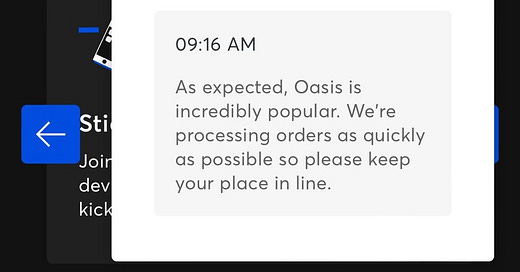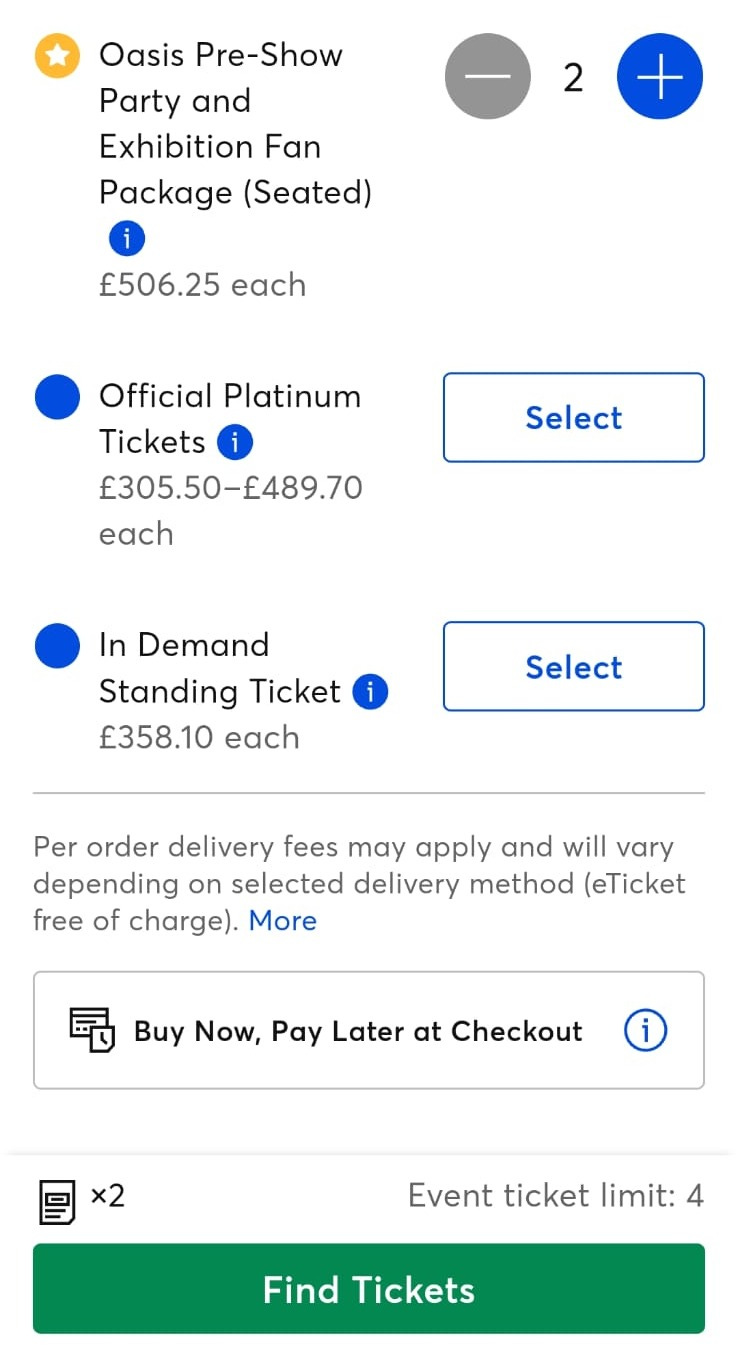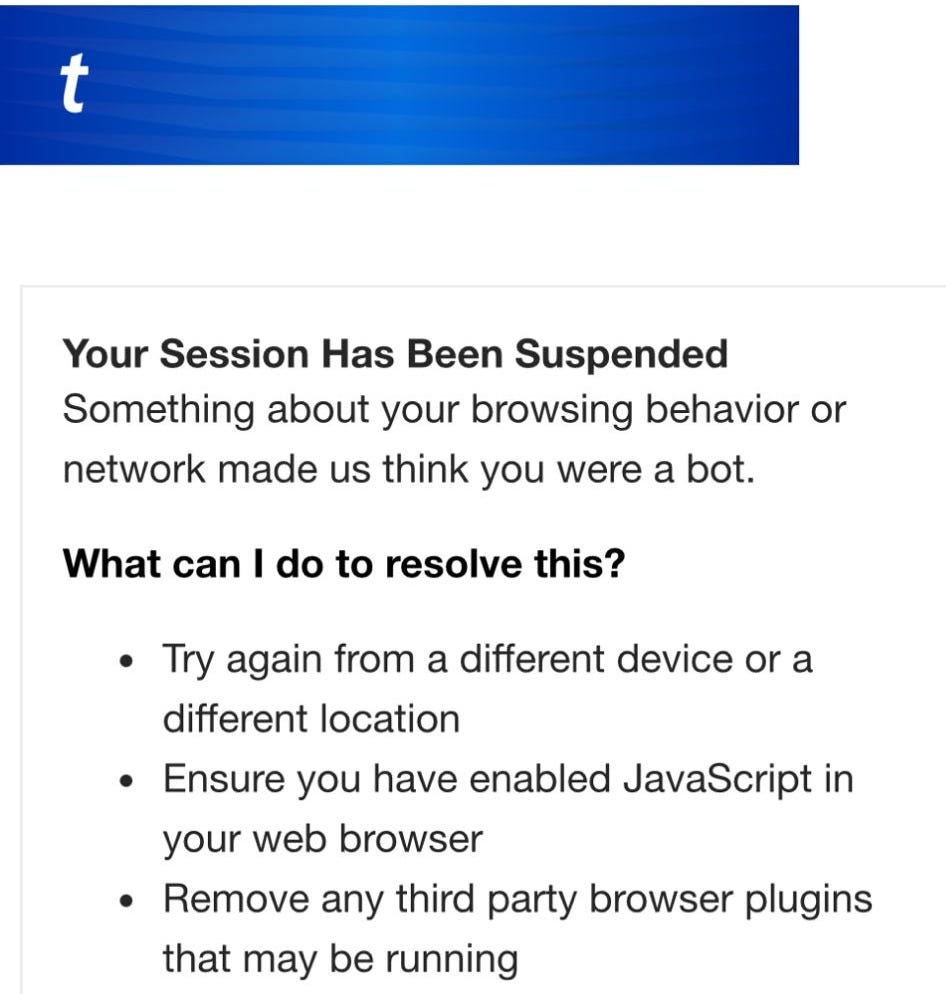BONUS: The Masterplan of Fan Exploitation
Next summer's must-see gigs are undoubtedly Oasis'. The band's much-anticipated reunion tour sold out on Saturday evening, leaving thousands of fans exploited. Whether they got tickets or not.
The guns may have fallen silent, but tens of thousands of Oasis fans are still pissed off. No one who has tried to buy tickets to Glastonbury Festival or to see Beyoncé, or Taylor Swift should be wholly surprised at the painful experience. Queues for the actual ticket queue. Events where demand far exceeds supply and the same issues still appear.
Only the specific technical faults differ. For Oasis’ ticket sale, it was ‘Error 503 Backend max.con reached’. Ticketmaster simply allow these problems to persist rather than upgrading their website and performing a load test beforehand to anticipate how the system will cope. It’s all part of the ‘buyer experience’, where technology has vastly deteriorated the practice of ticket selling.
No, the most egregious aspect of the experience wasn’t the array of expected technical issues, rather how fans were treated if they actually got through to buy a ticket. Prices had been revealed before Friday’s presale and seemed a little high yet if Taylor Swift can charge an average of £120 for similarly-sized shows then Oasis’ much-anticipated reunion tour can go a little higher. Standing tickets were set at around £150 each, including fees, with stadium seats ranging from £73 to £205, also including fees. As it transpired, these seats could include viewing restrictions and the cheapest bracket was for accessible tickets.
Dynamic Pricing/Price Gouging
Statements came out from the band that only trusted resellers such as Ticketmaster and Twickets could be relied upon to sell tickets at face value. Buy from anyone else, and you can expect your ticket to be cancelled. Great. Avoid Stubhub and Viagogo, even though both sites had tickets on sale straight after the presale. It’s a grubby business, but at least anti-tout measures were in place. They were looking out for fans, or so it seemed.
At what point does a swindle become a scandal? When the shameless exploitation of a fanbase’s blind loyalty becomes a government concern. Surge ticket pricing will be reviewed and the culture secretary, Lisa Nandy, has called the inflated prices ‘incredibly depressing’. This relates to those standard tickets jumping in price from £150 to £358, as numbers ran low. Bait and switch, where advertised ticket prices had more than doubled at the checkout and you’re still encouraged to buy them. Naked capitalism at its worst.
Of course, none of that was advertised initially, nor was expressed with any prior transparency. Why bother avoiding being ripped off by a tout when you can be legitimately ripped off at the point of purchase?
This is the point when the ‘experience economy’ comes into effect. The fear of missing out on seeing Liam and Noel scowling at each other on stage again. Just how much would you pay for the opportunity? Even though, you cannot be promised an extravagant stage design or even a smile. Rather, the band can simply turn up, go through the motions, collect their pay cheques, and move on. Whatever balance may have existed between economic returns and doing right by the fans has vanished.
After queueing for hours for that one gig, you were faced with two options. Those tickets at their advertised prices had all gone, and no manner of combinations would result in anything other than an unavailable request, as each ticket type was still listed. Either buy the tickets at grossly inflated prices, or leave the queue and start at the back for another gig on the tour. After all that waiting, why could you not simply choose another gig to buy tickets from? Or, better still, stagger out the dates so different ones sold at different times to reduce the overwhelming load?
The tour eventually sold out at 1900, a full ten hours after tickets had gone on sale, as buyer manipulation tactics failed to fool almost everyone. Clearly, those platinum tickets had put thousands of fans off at the checkout, but those people who believe that they’re gonna get away for the summer are in for a tough choice. That is, if they were deemed human, as many were thrown out at the checkout due to ‘suspicious behaviour’ or ‘bot-like activity’.
Ticketmaster are undoubtedly unfit for purpose to be responsible for exclusively selling tickets for hugely in-demand shows. Fans do not want to acquiesce to such abhorrent practices but are forced to as acts will still be forced to use them due to corporate greed.
The Live Music Monopoly
The live music monopoly remains and was at work when Oasis tickets went on sale at the weekend. When you delve a little deeper, it all makes capitalist sense. The promoter, Live Nation, owns Ticketmaster, so when a huge band wants to use exclusive Live Nation venues, they use Ticketmaster as the exclusive ticket seller. Delve deeper still, and Gigsandtours are managed by SeeTickets on behalf of S.J.M Concerts. All the same people get paid eventually, though other artists have tried to break it up.
Back in November 2022, demand for Taylor Swift’s Eras Tour was described as astronomical. A stunning 3.5 million fans registered for Ticketmaster’s Verified Fan presale. As will become familiar to millions, the website crashed and users were logged out. Ticketmaster alleged that they were unprepared for heavy site traffic, while Live Nation attributed the blame to Swift’s ‘overwhelming’ demand. Of course, touts then put tickets on resale websites and Ticketmaster was seen as deceitful.
The warning signs have been there for years. Pearl Jam raised concerns about Ticketmaster’s service fees back in 1994 and a federal investigation was launched into the alleged monopoly at work. Evidently, not a lot has changed since then. Despite US Congress getting involved twenty years ago, the monopoly remains, and the practices remain the same. Though Robert Smith of The Cure did convince Ticketmaster to refund their unduly high fees in 2023. It seems unlikely that Oasis and their representatives are likely to do the same.
Because it is possible to sell tickets to an arena tour and not exploit your fans. Take Paul Heaton for example. The solo artist and former Beautiful South and Housemartins frontman announced a tour where tickets retail for just £35 +fees. He’s still going to turn in a profit too. The thinking is that the gigs will still easily sell out, yet fans can enjoy a beer and buy some merchandise at the gig and add to the atmosphere. In turn, that means even more money goes towards the venue rather than the ticket sellers and promoters. As we know, live music venues in the UK are on their knees and when Oasis could have put in a ‘grassroots venue fee’, they chose not to.
Why would you put your life in the hands of a rock ‘n’ roll band? As of the time of writing, the band themselves have remained silent. Make no mistake, the Gallagher brothers and the tour promoters signed this off. They would have known of the in-demand price gouging for gigs that would inevitably sell out. The ‘working class heroes’ have exploited their own fans for a money-grabbing opportunity. Fans who are paying the price for Noel’s divorce after all. For those who did get tickets, was it worth the aggravation?






